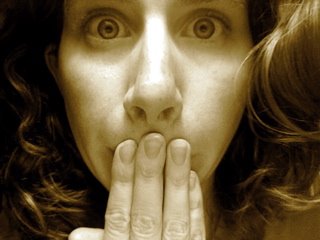Arrate: Jorge Arrate is the candidate for the communist party. He held a position (economic adviser of some sort) in the government of Salvador Allende. He seems to have the most interesting, liberal policies. Pretty much everyone I know who plans to vote plans to vote for him. They also all seem confident that he will only take about 12%. Since most of what I know about candidates I infer from the campaign signs that litter EVERY intersection in the city, Arrate has an appealing, Mark Twain-like style. I dig him.
Enríquez-Ominami: As far as I can tell, Marco Enríquez-Ominami's most distinctive qualification is that he is sort of a babe. He's thirty-six years old and has very little experience to recommend him, except that his dad was a popular figure in leftist politics. I get the feeling that a candidate like Ominami would get a lot of flack in the US for being a spoiler. He's not going to win, and it seems like he's only splitting the centrist vote. Because technically there is a coalition system in Chile rather than a strict bipartisan system this isn't exactly true. Ominami has the endorsement of four parties. Practically speaking, this run seems more like an attempt to set a foundation for future national campaigns. But for now, we can all enjoy his super-shiny hair and dazzlingly white smile.

Frei: Eduardo Frei seems like sort of a wet blanket. I mean, dude is never smiling in his campaign photos. What's more, he has already been president and ran into some problems with corruption. It's a bit puzzling that he would win the candidacy at all. But he too is the progeny of a figure in the Chilean left. His father was president before Allende in the late 60's. He's become something of a martyr since it was recently proved that Pinochet had him slowly poisoned to death. The major problem with Frei the second is that everyone thinks his government will simply perpetuate the status quo. People are pretty concerned about the state of health care and education here (public schools were closed for more than a month due to a strike this year). Many people care more about change than they do about the potential policies that will be implemented. You could see it as a twisted turn in the world-wide, Obama-ist change movement.
Piñera: Is currently leading all polls. Sadly because he's a total neoliberal. Additionally he is the richest man in the country. Which is always sort of suspect (remember how Steve Forbes always seemed vaguely unreliable?). The final creep-factor for Piñera is that he is highly involved with Opus Dei. Opus Dei seems to have quite a lot of power in Chile and often comes up when discussing right-wing politics. Generally I nod knowingly during such conversations, when in reality everything I know about Opus Dei I learned from The da Vinci Code. So if (and, it sadly seems, when) he wins he'll probably move to privatize health care further and implement even more voucher programs for schools (or the Chilean equivalent of vouchers which seem to subsidize private schools with public money). And we all know how great those ideas work.... Sigh.
Election Policy: Certainly every democratic system has its short-comings. There are two particularly strange policies concerning elections in Chile.
-First of all, if you are registered to vote, it is illegal not to. Unless you can prove to the police that you were sick or more than 300kms from your poling place you must pay a fine. People have told me this discourages them from registering. While I understand that the idea is to underscore the importance of the democratic process, this just seems a little backwards. If I'm not mistaken, this law has been overturned and this is the last affected election.
-Secondly, it is illegal to drink the night before the election. Apparently all the bars are closed. This sort of cramps my style since I unwittingly planned a margarita-soaked, Mexican dinner party for tomorrow night. I hope I don't get arrested.
I'm sure I'm grossly over-simplifying and over-editorializing here. Even after two months it's hard to fully understand the structure and history of politics in Chile. Anyhow, it will be interesting to watch how things go. I don't think Piñera has enough votes to avoid a run-off, but people seem more and more certain of his eventual success. I'll be sure to keep you all posted.


2 comments:
i like the recaps.
btw, its not that michelle bachelet has decided not to seek another term so much as you cant be immediately reelected i dont think.
unfortunately (and oddly) i haven't seen a single poster for the good looking guy ;-(
lydia, thats what i was thinking! where were his posters? and yeah, the current president isnt allowed to run for re-election, but could in another 4 years.
Post a Comment